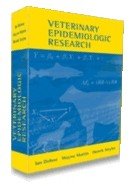Veterinary Epidemiologic Research epub
Par piper constance le mercredi, septembre 23 2015, 23:10 - Lien permanent
Veterinary Epidemiologic Research. Ian Dohoo, Wayne Martin, Henrik Stryhn

Veterinary.Epidemiologic.Research.pdf
ISBN: 0919013414,9780919013414 | 727 pages | 19 Mb

Veterinary Epidemiologic Research Ian Dohoo, Wayne Martin, Henrik Stryhn
Publisher: AVC Inc.
These techniques were historical; statistical, including meta-analysis and logistic regression; and epidemiologic, including both case series and case control data. Peter Roeder is a veterinarian with broad experience of disease epidemiology, diagnosis and control and the functioning of veterinary services. Departmental programs, training includes appropriate course work and research in areas such as Comparative Anatomy and Physiology, Pharmacology, Biochemistry/Molecular Biology, Animal Nutrition, Comparative Toxicology, Immunology, Pathology, Parasitology, Epidemiology, and Infectious Diseases. Summary of an EU research project (SSPE-CT-2003-501599) in the framework of the FP6 programme. Latest techniques in epidemiology, veterinary diagnostics, and biosurveillance from the following collaborators: Texas A&M Veterinary Medical Diagnostic Laboratory, the U.S. Do not miss to check the Astounding image in Veterinary Epidemiology: An Introduction article galleries for your next inspiration by clicking the thumbnail below. After the unexpected emergence of Bluetongue virus serotype 8 (BTV-8) in northern Europe in 2006, another arbovirus, Schmallenberg virus (SBV), emerged in Europe in 2011 causing a new economically important disease in ruminants. Epidemiology and control of classical swine fever (CSF) in wild boar and potential use of a newly developed live marker vaccine. Environmental health, food safety and security, food production systems, regulatory medicine, diagnostic laboratory medicine, biomedical research, health promotion and disease prevention, public health research, and epidemiology. Strengthen the linkage between public health and veterinary epidemiology. DISCIPLINE: veterinary epidemiology. The graduate program provides training in basic and applied veterinary medical research for qualified students with a baccalaureate degree or a DVM or equivalent degree. Enrollment is open to scientists, clinicians, veterinarians and public health professionals with a background in field investigations and epidemiology. The School of Veterinary Medicine and Science has an active research programme examining epidemiological factors associated with training success of guide dogs. Conduct research activities on priority public health problems. WEBSITE: https://intranet.sggw.pl/intranet/?q=taxonomy/term/30. POSITION : research-didactic assistant. Gallery of Veterinary Epidemiology: An Introduction. The NRC report also warned that veterinary medical education in its current form is unsustainable due to a decade-long decline in funding for education and research, and increasing student debt load relative to income.
Metric Pattern Cutting for Menswear pdf free
Elantris epub